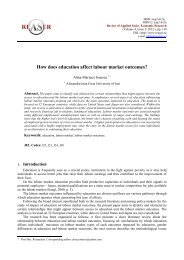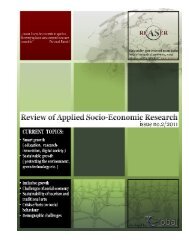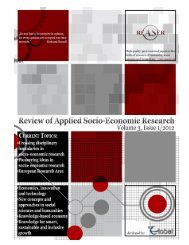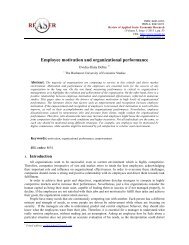new characteristics of inequalities in the information society and ...
new characteristics of inequalities in the information society and ...
new characteristics of inequalities in the information society and ...
Create successful ePaper yourself
Turn your PDF publications into a flip-book with our unique Google optimized e-Paper software.
ISSN: 2247-6172;<br />
ISSN-L: 2247-6172<br />
Review <strong>of</strong> Applied Socio- Economic Research<br />
(Volume 5, Issue 1/ 2013), pp. 28<br />
URL: http://www.reaser.eu<br />
e-mail: editors@reaser.eu<br />
rooted <strong>in</strong> <strong>society</strong> <strong>and</strong> permeate religiuos values as well. This ultimately promotes <strong>the</strong> diffusion <strong>of</strong><br />
education <strong>and</strong> <strong>the</strong> achievement <strong>of</strong> higher levels <strong>of</strong> education. In l<strong>in</strong>e with <strong>the</strong> <strong>the</strong>oretical<br />
framework, <strong>the</strong> empirical evidence shown <strong>in</strong> <strong>the</strong> paper seems to po<strong>in</strong>t to some conservative<br />
dimension <strong>of</strong> Catholicism <strong>in</strong> <strong>the</strong> Lat<strong>in</strong> American countries considered. In fact, Catholic religion<br />
with respect to Protestantism tends to curb children’s achievement <strong>of</strong> higher education.<br />
Never<strong>the</strong>less, <strong>the</strong> evidence po<strong>in</strong>ts out <strong>the</strong> critical role <strong>of</strong> development <strong>in</strong> counterbalanc<strong>in</strong>g <strong>the</strong> latter<br />
effect. In fact, when <strong>the</strong> development level is taken <strong>in</strong>to account, <strong>the</strong> overall marg<strong>in</strong>al effect <strong>of</strong><br />
religion on <strong>the</strong> probability <strong>of</strong> university with respect to lower education is negative at <strong>the</strong> lowest<br />
level <strong>of</strong> development. In this case, traditional values prevail <strong>and</strong> Catholic religion overall reduces<br />
<strong>the</strong> probability <strong>of</strong> children’s higher education. Whereas <strong>the</strong> same effect is positive if it is evaluated<br />
at <strong>the</strong> highest level <strong>of</strong> development, support<strong>in</strong>g <strong>the</strong> idea that <strong>the</strong> presence <strong>of</strong> modern values<br />
improves children’s educational achievements by counterbalanc<strong>in</strong>g <strong>the</strong> negative <strong>in</strong>fluence <strong>of</strong> <strong>the</strong><br />
conservative dimension <strong>of</strong> Catholic religion on higher education.<br />
In light <strong>of</strong> this analysis, it is not mistaken to believe that besides <strong>the</strong> key variables generally<br />
considered <strong>in</strong> <strong>the</strong> literature, religion <strong>and</strong> development may play a non-negligible role <strong>in</strong> expla<strong>in</strong><strong>in</strong>g<br />
educational achievements.<br />
Acknowledgements<br />
We wish to thank Christian Di Pietro, Luigi Senatore ed Antonio Abatemarco for <strong>the</strong>ir remarkable<br />
help.<br />
Analytical Appendix<br />
1. Pro<strong>of</strong> <strong>of</strong> proposition 2<br />
Let us consider <strong>the</strong> follow<strong>in</strong>g <strong><strong>in</strong>equalities</strong> from (6) <strong>in</strong> <strong>the</strong> ma<strong>in</strong> text:








